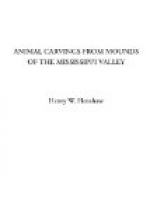ILLUSTRATIONS.
Fig. 4.—Otter from Squier and Davis
128
5.—Otter
from Squier and Davis 128
6.—Otter
from Rau. Manatee from Stevens 129
7.—Manatee
from Stevens 129
8.—Lamantin
or Sea-Cow from Squier and Davis 130
9.—Lamantin
or Sea-Cow from Squier 130
10.—Manatee (Manatus
Americanus, Cuv.) 132
11.—Manatee (Manatus
Americanus, Cuv.) 132
12.—Cincinnati
Tablet—back. From Squier and Davis
133
13.—Cincinnati
Tablet—back. From Short
134
14.—Toucan from
Squier and Davis 135
15.—Toucan from
Squier and Davis 135
16.—Toucan from
Squier and Davis 136
17.—Toucan as figured
by Stevens 137
18.—Keel-billed
Toucan of Southern Mexico 139
19.—Paroquet from
Squier and Davis 140
20.—Owl from Squier
and Davis 144
21.—Grouse from
Squier and Davis 144
22.—Turkey-buzzard
from Squier and Davis 145
23.—Cherry-bird
145
24.—Woodpecker
146
25.—Eagle from
Squier and Davis 146
26.—Rattlesnake
from Squier and Davis 147
27.—Big Elephant
Mound in Grant County, Wisconsin 153
28.—Elephant Pipe.
Iowa 155
29.—Elephant Pipe.
Iowa 156
30.—The Alligator
Mound near Granville, Ohio 159
31.—Carvings of
heads 162
32.—Carvings of
heads 162
33.—Carvings of
heads 162
34.—Carving of
head 163
35.—Carving of
head 163
ANIMAL CARVINGS FROM MOUNDS OF THE MISSISSIPPI VALLEY.
By H. W. Henshaw.
INTRODUCTORY.
The considerable degree of decorative and artistic skill attained by the so-called Mound-Builders, as evidenced by many of the relics that have been exhumed from the mounds, has not failed to arrest the attention of archaeologists. Among them, indeed, are found not a few who assert for the people conveniently designated as above a degree of artistic skill very far superior to that attained by the present race of Indians as they have been known to history. In fact, this very skill in artistic design, asserted for the Mound-Builders, as indicated by the sculptures they have left, forms an important link in the chain of argument upon which is based the theory of their difference from and superiority to the North American Indian.




